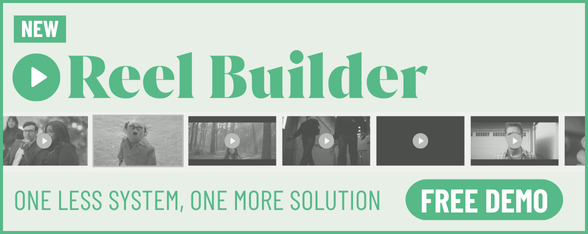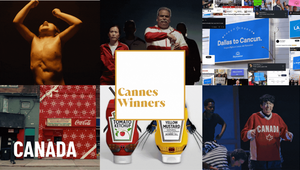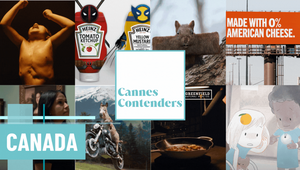
Creative and Strategy: Two Sides of the Same Coin for FCB Canada

2022 has been a big year for FCB Canada. In June, it won two Gold Lions, and was named Global Strategy Agency of the Year at Cannes. In September, president Bryan Kane became CEO. And just this month, the agency won its sixth Digital Agency of the Year Gold (in Canada) in seven years. From this news, it is evident that FCB Canada not only has its finger on the pulse, but a confident vision for what it will take to remain at the top for the coming future.
But what does it take to actually achieve this level of success? For a start, maintaining strong relationships with the likes of the Canadian Down Syndrome Society, the Bank of Montreal, and LOTTO MAX certainly seems to help. But even more essential than that are the people. Specifically, the leadership team of Bryan, CSO Shelley Brown, and CCO Nancy Crimi-Lamanna have helped drive much of the agency’s recent accomplishment by evolving FCB Canada with the times - seeking to come up with innovative creative ideas that nobody, in Canada or outside of it, have ever considered before.
To learn more about what makes FCB Canada tick, LBB’s Josh Neufeldt sat down with Bryan, Shelley and Nancy to discuss the recent Cannes wins, Bryan’s promotion, and what the agency’s future looks like.
LBB> Congratulations again on winning Cannes Lions 2022 Global Strategy Agency of the Year! What does this achievement mean to you, and what does this mean to FCB Canada?
Shelley> Global recognition of something we've been working very hard at for a number of years feels pretty fantastic. While we are known in Canada for the quality of our strategic thinking - and we get consistently recognised for that - to have it recognised on the global stage always means that much more. As a Canadian agency, we don't like to compete only in Canada; we compete with everybody in the world and we want to be able to hold our heads up high on that. But for us, it really speaks to the fact that we have invested in strategy. We have a relatively large strategy group (about 26 people, which for Canada is pretty big), and we're not even the biggest agency in the country. But we've done that really deliberately because we believe strategy is important.
We also recognise how strategy is changing and how rapidly it's changing, so we have strategists who are experts in data, content, etc., as what we believe marketing really represents is expanding, morphing, and changing, and we really feel like we have a strategy department that's ready to tackle that. And being recognised on a global level at Cannes for the quality of our strategies to us just means that we're on the right track and the things we've always believed are, in fact, true.
LBB> To what do you attribute your success at Cannes? What went into making FCB Canada the Global Strategy Agency of the Year?
Shelley> We have always felt that strategy and creative are so intimately connected that they are basically two sides of the same coin. We like to say everything is strategy and everything is creative, and the moment you start to pull those things apart is the moment you get yourself into trouble. Of course we have a robust set of strategic tools that we use to get us to really smart work, but they're not really strategic tools. They're account management, data, and creative strategy tools, because we use them together and we tackle the business problems of our clients as a team - from a strategic point of view, from a creative point of view, we do it all together.
Another key point is that we're always trying to solve business problems by using creativity as an economic multiplier. But to do that, you can't just start with a creative communication task. You have to start by asking, ‘what is the business problem?'. That's always where we begin, because fundamentally, we believe that using ideas to solve business problems is what we do for a living. We drive business, we build brands, and we do it all at the same time because we believe great ideas do both. The ideas of ours that won at Cannes are exactly those kinds of ideas. They solve a real issue in the real world, and they do it in such a way that it's also building the brand at the same time. And that's always our task.
LBB> Success doesn’t come without good people at the helm. How has your leadership together driven the success we’re seeing?
Bryan> As a core team, we're pretty similar in the fact that we all live in the work. We got into this business for a reason - we love the work - and it wasn't necessarily a spreadsheet that lured me in. By living in the work, what that brings for us and what we all share is a degree of humility (yes, I know that it sounds not humble saying that you're humble). What I mean by that is, I think humility is really the fact that although we all have a lot of experience, living in the work allows us to see how rapidly the world is changing, which makes us realise just how much we don't know, and how awesome it is to work with people who do. So, we surround ourselves with specialists. For example, I'm not a guru in gaming, but I love jamming with teams that are, and helping to develop and evolve our thinking with them has probably been one of the things that - when you talk about a leadership style - really represents us being in the work with our teams, together.
LBB> How would you define your leadership styles as CEO, CSO and CCO? What factors have played the biggest influence on these styles?
Bryan> It's funny, because our individual styles are all radically different, and I think that's what makes us tick. We share a common discomfort for the status quo, and a recognition that we need to evolve rapidly. But beyond that, we look at changes in the media landscape (technology, emerging platforms), and with those different perspectives, we challenge each other on what the impacts are going to be for our clients, the agency, and the talent that we need. Through that, we've been able to really uncover and unlock opportunities for our clients and for the future of the agency.
Nancy> I think we all get bored very easily, so we're always looking at ways we can innovate - not only in our work, but in the way we think and how we solve problems. I think our leadership style is to be very curious, try to find what’s next, determine what's important (not only to us as a brand, but to our client), and then push into that and hire people that are better than us. It's great to have them help us get there, and they really help us with achieving the goal of always striving to deliver.
LBB> Building on this, what does your collaborative process look like?
Nancy> Some people might be surprised to learn that we are really involved in the work. We're kind of a sleeves-rolled-up team. Shelley still writes briefs, I sometimes still write scripts if we're struggling, etc. We aren't the type of leaders that you're going to meet in a pitch room and then not see us again until we buy you a drink at Christmas. We work with the team throughout the process, and that does not mean micromanaging. It means setting us up for success right from the beginning, and what that might look like is really getting the team to work together.
As Shelley said, strategy and creative are kind of two sides of the exact same coin, so we don't decouple those disciplines at all. We come together to brainstorm and workshop ideas. The strategy lead is in the room with the creative leads to brainstorm and be a part of the process. By keeping people involved at all steps, we ensure that we have multiple voices in the room from different disciplines to highlight our blind spots, which is really, really important to us. It's about setting the tone, setting the pace, and setting the guidelines and expectations off the top, and then checking in to ensure the teams are working together to deliver.
LBB> Bryan, you’ve become CEO at a time of good momentum and growth - an intriguing challenge because there isn't some 'big fix' that needs to be worked out. How does that influence the way you're approaching your role at FCB Canada?
Bryan> I’m going to celebrate by going home and taking the rest of the day off, haha! Jokes aside, when we talk about the role, I don't necessarily look at it as an individual pursuit. Every day we're arm in arm, tackling every problem across the agencies. It doesn't matter if it's strategy, creative or operations, we all come together. But, I think that when we look at this moment from an agency perspective, it's really about using this momentum to accelerate our modernisation. How can we push harder, faster, and further into the areas that are important from an agency perspective? In this regard, momentum is an incredible gift, and we can't allow ourselves to miss that opportunity. So, I think our focus is just the acceleration of what we're doing, and what we want to be doing.
LBB> What work from the past year that sticks out as being particularly important to your agency’s success?
Nancy> The first one I'd like to mention is our work with the Canadian Down Syndrome Society. That is a very long term relationship for us. We've been working with them for six years, and every year, our goal is to stretch the boundaries of what advertising can be and what agencies can do. We've published a scientific research paper which won this year at Cannes, and we changed Google with 'Project Understood'. Specifically, because Google's voice technology only understands one in three words from an individual with Down syndrome (and access to voice assistants could offer life-changing independence for the six million people living globally with Down syndrome), we invited them to become teachers, using their voices and voice data to train Google’s speech recognition model to understand them. Work like this is core to us, and it's a good demonstration of how we think about solving problems in the world.
Another big one would be ‘Dream Drop’, which is also a good example of how we really love inventing things. For this, to convince people to play the lottery, we invented the first wearable lottery ticket. I could go on and on, but I think it’s clear that we're really trying to invent things, hack things, change things fundamentally, and really drive innovation in all of our work and for our brands.

LBB> Often, Canadian advertising is forced to contend with smaller budgets than, say, the US. How does that factor into the way you work?
Nancy> I think it's really that we're used to working with smaller budgets. We always have, and I think our budgets are typically 50% smaller than the budgets below the border. So aside from really having to be efficient, we have to focus on thinking differently. We can't spend our way to create great work, the idea itself has to be great. As a result, I think it forces us to be really scrappy. We can't afford the luxury of working in silos, and we have to include earned and owned channels into all of our thinking, along with pay.
It’s also about embracing creative opportunity at all phases. As a Canadian, you can't love TV more than TikTok, or more than a gaming campaign. You have to make each one of those things really important and value them, as well as value the fact that creativity can be found at every single moment. I think there's always a creative opportunity, and because Canadians have smaller budgets to work with, they take advantage of every single opportunity presented to them. As a matter of fact, it’s for this reason that at FCB, we actually see it as an advantage.
Shelley> It is an advantage, and this is one of the places where we're really helped by our decision to bring strategy and creative so close together. It helps us find the opportunities and moments where we say, 'Oh, if we can unlock ‘x’ at this moment, this thing will really take off', and so we work with the creative team to really seize those opportunities, even if they’re somewhat less sexy. After all, that's our job. We make it sexy, and that’s what we do together. In doing so, we really stretch the boundaries of what people traditionally think of as advertising. Is publishing a research paper marketing? Yes it is, if we make it so. It's that kind of thinking that has led to this award, and I honestly think it comes from being in Canada.
LBB> What does a win like this mean for the Canadian ad industry as a whole? And what are your thoughts on the Canadian ad industry in general, at the moment?
Nancy> We continue to show up, and I honestly think it just validates how freaking amazing we are. We're doing amazing work, we're getting a lot of recognition around the world for it, and I think the last few years at Cannes have been our best years. As a whole, we've seen Canada continue to break records. Last year, I believe we were the sixth most awarded country in the world, and we were sitting just behind India who are like 35 times bigger than us - so it's clear that we are punching way, way, way above our weight level. This is why I think our tendency to have an inferiority complex is just not based on anything true. We can really hold our own on the world stage, and I think the world is catching on. There's so many Canadians who are now being recruited into other parts of the world, and that's based on the quality of the work we're doing.
LBB> How has FCB Canada evolved over the past months/years? And what do the coming months hold in store for you all, and the agency?
Bryan> When we look to the months and years ahead, it really sort of comes back to this ‘never finished’ mindset. Every day, we run to the office to build the agency we've always wanted to work for, to do the work we've always wanted to do, and most importantly, to do it with the people we've always wanted to do it with. A big part of that comes from thinking of ourselves as always under construction, challenging ourselves to figure out what we can do more of and what we could do better. That leads us to perpetually invest in capabilities and talents who can help us bring ideas to life in new ways, unlock creative opportunities and possibilities - for both the agency and, more importantly, the client - and who can help us give our clients an unfair competitive advantage by approaching things differently than those who fall back on standard industry conventions.
We're also always putting bets down in terms of what capabilities are going to be most important going forward, and we're making significant investments in those areas. When you think about production and being able to produce timely content, we want to be right there so we can participate in culture as it evolves, and as new things continue to emerge. A big part of that is gaming, and placing a focus on how we can build out our expertise. In doing so, we draw heavily upon a lot of the data and technology that we already have, as well as analyse how we can deploy it and bring it to market in entirely new ways. And then, another big subject is cookie deprecation and the importance of first party data. It's asking the question of how we can double down on our technology and data capabilities so that we can build those direct relationships with consumers, and then connect that to everything else that we're doing.
LBB> What is your vision for the future of FCB Canada? And how will you work together to achieve it?
Bryan> A lot of the way that we talk about our vision is internal. But when we think about the vision of the agency and what's really driving the people who come to work every day, the answer is always the focus of being Canada's most innovative agency. But what does innovation mean? Some people assume it means the latest, greatest, shiniest toy from a technology perspective, but it’s absolutely not that. Instead, innovation is about challenging ourselves to be mavericks of modern marketing, and thinking about how we can approach a complete spectrum of our clients' biggest business challenges. We want to bring creativity and apply that in new and different ways across the entire journey. I think it’s fair to say that ultimately, we want to do things that nobody has ever thought of, and really create the model of the future from an industry perspective.
Nancy> We try to carry this ideology [that Bryan discussed] into all of our work. We were on the innovation shortlist this year at Cannes, and work that allows us to keep getting back up there is super important, because it means we get to break things and think in ways that people - and maybe the industry - haven’t quite considered yet. We're always trying to stay that extra step ahead.
Shelley> This kind of thinking actually helped us become the most awarded agency at the 2021 Media Innovation Awards… and we don't have a media department. It's just about approaching problems with an open mind, using all of the skills we have across the agency, and avoiding silos. That is what allows us to really invent new ways of solving problems, and really redefine what an agency can do.















